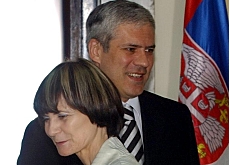Calmy-Rey defends Swiss position on Kosovo

On the eve of an official visit to Kosovo, the Swiss foreign minister has defended Switzerland’s goal of achieving a form of independence for the province.
But in an interview with swissinfo, Micheline Calmy-Rey stressed that a decision on Kosovo’s future status could only be taken with the support of the government in Belgrade.
Calmy-Rey’s visit – which gets underway on Saturday – comes at a sensitive time for Swiss relations with Serbia and Montenegro.
Last month Serbian President Boris Tadic told the Swiss foreign minister in no uncertain terms that he was not open to discussion about independence for Kosovo.
Belgrade has also repeatedly called on Switzerland to remain neutral and not take a position on the province’s future.
Kosovo officially remains part of Serbia and Montenegro, the union that replaced Yugoslavia. But it has been under United Nations and Nato administration since a 78-day Nato-led air war that halted a Serb crackdown on ethnic Albanians in 1999.
Before she returns to Switzerland on August 2, Calmy-Rey will celebrate Swiss National Day on Monday in the company of Swiss peacekeeping forces stationed in the province.
Swiss soldiers have been deployed as part of the multinational peacekeeping force in Kosovo since 1999.
swissinfo: What are you hoping to achieve during your visit to Kosovo?
Micheline Calmy-Rey: The purpose of my visit is to explain to the Kosovar authorities the Swiss point of view regarding the political future of Kosovo. I am also going to underline the importance of Swiss engagement in Kosovo – including financial and technical assistance – for stability and the promotion of peace.
I’d like to emphasise that Kosovo is a very important region for our country. Ten per cent of the population of Kosovo live in Switzerland. So Kosovo’s interests are also ours, especially in terms of security.
swissinfo: Serbia has made it clear that it is unhappy with Switzerland’s suggestion that Kosovo could move towards some form of independence. How are you going to make progress without Serbia and Montenegro’s support?
M.C-R.: We will continue to communicate our position to both sides. And our position is clear-cut, unbiased and unequivocal. Our idea is that the evolution towards a form of formal independence must happen under close international monitoring as well as through negotiations with the authorities in Belgrade, upon whom this independence cannot be imposed.
On the other hand, our position on the achievement of [basic] standards in Kosovo remains unchanged. We will not give way to any compromise with regard to improvement of these standards, especially when it comes to the situation of minorities and security issues. A significant international presence [in the province] will continue to be necessary as long as these standards are not achieved. Switzerland is determined to pursue its commitment side by side with other members of the international community.
swissinfo: Serbian President Boris Tadic has said he will “never accept” an independent Kosovo and will do everything in his power to prevent secession. How do you go about convincing him otherwise?
M.C-R.: We will not push for a particular solution. All we are trying to do is convince both parties that the time has come to start a political dialogue at the highest level on the status question.
swissinfo: Some parliamentarians in Bern have criticised your stance on Kosovo, saying it is a major foreign-policy shift and that as such it should be discussed by parliament. What is your response?
M.C-R.: [All I can say is that] our balanced position on Kosovo is consistent with our general policy towards the Balkan countries and was approved by the government last May.
swissinfo: By coming out with a clear line about the future status of Kosovo, are you not jeopardising Switzerland’s role as a neutral facilitator?
M.C-R.: In accordance with our policy of neutrality, we have always taken unequivocal positions which are based on assessments of the interests of all parties.
We have clearly expressed that it is important to take into account two equally legitimate desires. Firstly, the right of minorities to live in safety, to have the same opportunities for economic development, to have the same access to social services and education, and to exercise the right to return. And secondly, the will of the majority of the population to exercise its right to self-determination.
swissinfo-interview: Ramsey Zarifeh
Micheline Calmy-Rey begins a four-day trip to Kosovo – a UN-administered province within Serbia and Montenegro – on Saturday.
She is scheduled to meet President Ibrahim Rugova and Prime Minister Bajram Kosumi.
Calmy-Rey is also expected to meet representatives of non-governmental organisations and opposition parties in Kosovo.
During her trip she will inaugurate a Swiss-funded psychiatric unit at Pristina University Hospital.
Switzerland has been a major place of migration for Kosovo Albanians.
Many of them came to Switzerland as seasonal workers well before war broke out in the province.
Others came as refugees after the conflict began, often joining relatives who already lived in Switzerland.
No official figures are available, but it is estimated that around 150,000 people from Kosovo currently reside in Switzerland.

In compliance with the JTI standards
More: SWI swissinfo.ch certified by the Journalism Trust Initiative











You can find an overview of ongoing debates with our journalists here . Please join us!
If you want to start a conversation about a topic raised in this article or want to report factual errors, email us at english@swissinfo.ch.